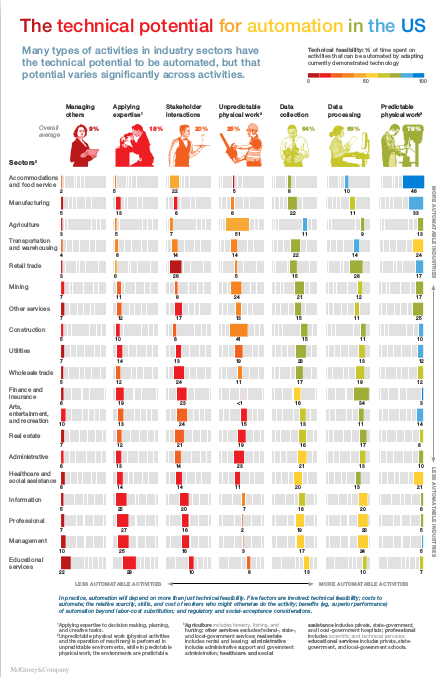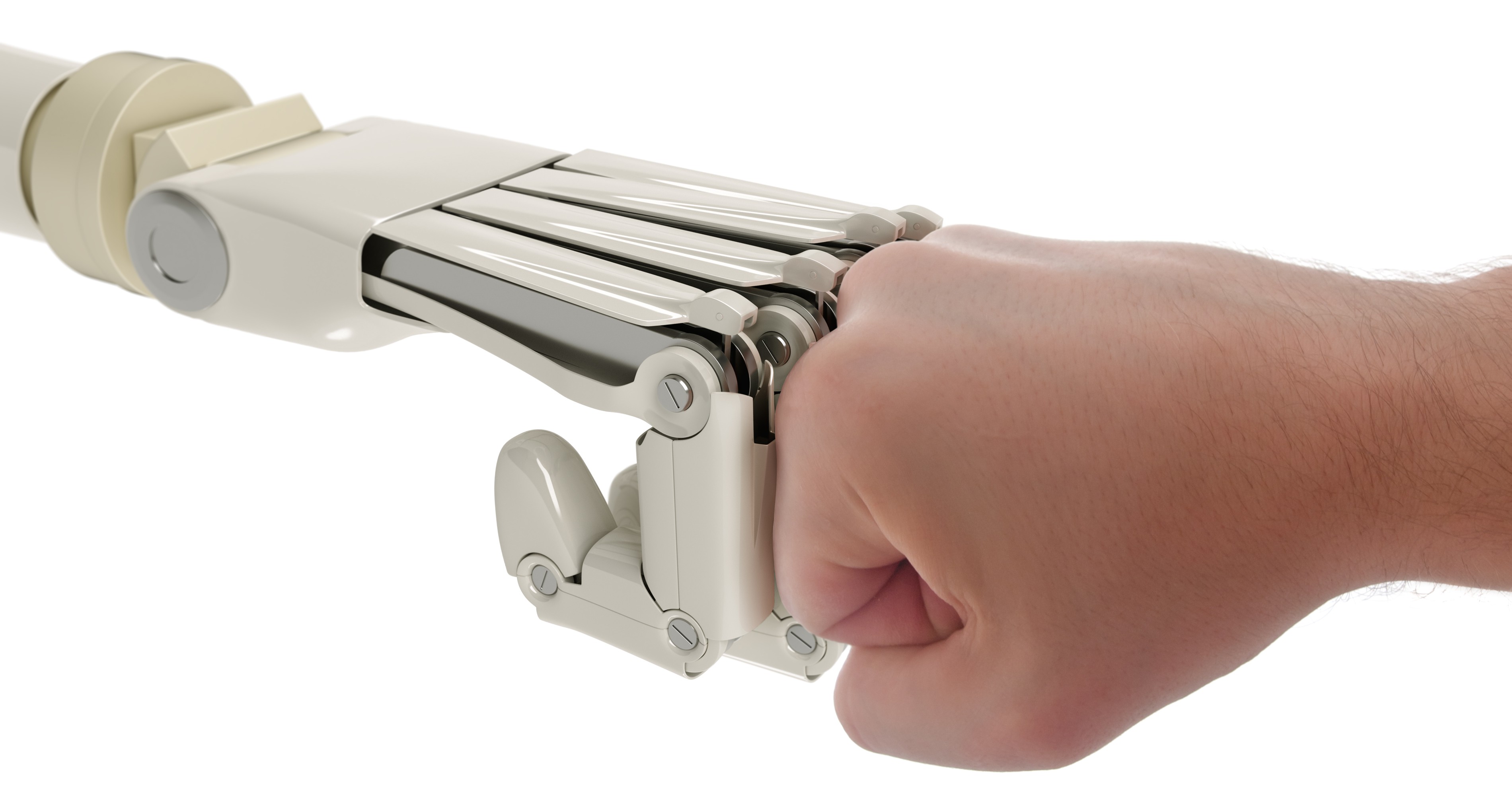Automation: the unstoppable future ~ Episode 00

It seems beyond debate: we are in the middle of the Fourth Industrial Revolution. And it's incredibly scary.
With the extensive use of computers, robotics and artificial intelligence, it looks like there won't be space for humans in the so-called Industry 4.0, as all the workers will be replaced by smarter and faster machines.
This is true just in part; if it's undeniable that many jobs could, and will, be automated in the future ( McKinsey estimated that currently demonstrated technologies could automate 45 percent of the activities people are paid to perform), the direct consequence might not be the vertical increase in unemployment, according to many studies and to the opinions of many experts.
Humans as a resource
The above-cited study from McKinsey, after having analyzed 2000 work activities for more than 800 occupations, arrives to a somewhat obvious but remarkable conclusion: humans are strategical, while machines are tactical. And it's from this conclusion that the discussion should start. From the First Industrial Revolution in 19th century, machines and automation have relieved workers from repetitive (tactical) jobs as the ones in the industry, while leaving more space for occupations requiring the use of imagination, empathy, creativity and common sense (strategical).

Image Source
Activities as teaching, managing people, nursery (sometimes known as knowledge works) as well as unpredictable physical activities (breeding animals outdoor for example) have in general a very low automation potential but require skills; this is one of the key point to understand where our future will go.
Reskilling Revolution
A recent study published by the World Economic Forum has analyzed 96% of the jobs currently employing people in the United States and shows that, through reskilling, 95% of the at-risk workers would find a new job with an average increase in the salary of 15.000$. These results might seem incredible, but are not new to people that study this problem: an easy example of reskilling is what happened with the introduction of ATMs in the banks. The introduction of the Automated Teller Machine (ATM) gave the human tellers the opportunity to upskill, giving the opportunities to the bank's costumers of having a wider range of financial services.
The previous example, in addition, brings us to another key point: the companies should recognize the potential hidden in their employees and shouldn't use technology to get rid of them. Melonee Wise, the CEO and founder of Fetch Robotics, said in an interview: "Your computer doesn't unemploy you, your robot doesn't unemploy you. The companies that have those technologies make the social policies and set those social policies that change the work force".
The role of the society and of the governments is crucial in the reskilling revolution, as the process is far from being immediate. The World Economic Forum estimated that 70% of the workers affected by the automation would need to retrain in a new career, which clearly requires time and investments.
Supporting the Revolution
Supporting reskilling could seem a philanthropic concept, but it's instead something that could turn out to be very good for businesses and economies. Nowadays the world is filled up with products that consumers don't need, while new technologies have opened paths to new opportunities not yet exploited; increasing the productivity of a factory might not be as remunerative as having a good idea (Facebook, Google, Uber and all these huge companies don't produce goods, but make an incredible amount of money).
Another very interesting solution is the one proposed by Bill Gates: taxing robots. Substituting human employees with robots means that industries would produce more while paying less taxes. This could be avoided by simply taxing robots as would be done with humans, and using those money to support reskilling, or more in general to support the welfare of the country.
This discussion is wide and super interesting, and its definitely one of the biggest challenges of the next years.
Hope to read in the comments your opinions, as well as suggestions on where to improve my next articles.
Francesco

This is the first post of a series, in which I will try to analyze the future of automation in different fields. Don't miss the next post in which I will write about autonomous driving
Suggested readings:
- http://www.businessinsider.com/bill-gates-robot-tax-brighter-future-2017-3
- https://www.businessinsider.com.au/6-jobs-that-new-technologies-are-creating-2016-3
- https://hbr.org/2018/01/the-future-of-human-work-is-imagination-creativity-and-strategy
- https://www.mckinsey.com/business-functions/digital-mckinsey/our-insights/where-machines-could-replace-humans-and-where-they-cant-yet
- https://www.weforum.org/press/2018/01/reskilling-revolution-needed-for-the-millions-of-jobs-at-risk-due-to-technological-disruption
That's a very well written and interesting article about one of the burning topics of our time.
However the advantages of automatization are obvious, I am still sceptical about the whole "no one will lose his job and everyone will get paid more" stuff. In general, that's not how things run for workers^^
Thanks for your comment!
When writing this article I was afraid of being too optimistic, as I work in this field and naturally am very excited about the future. For this reason, I tried to stick to documented studies made by authorities everyone can trust trying not to include too many personal opinions. It goes without saying that I'm depicting the best possible scenario, which to be realized requires good policies by the governments and people willing to upskill and start new careers. But in any case, differently from what the trend in this moment is, I believe it's important to talk in an optimistic way to encourage people.
Yes of course. Every new technology has its advantages AND disadvantages, and I agree that at the moment, there is more talk about the disadvantages of automatization - I really appreciate your angle of view here!
Having said this...Are you planning an introduction post anytime soon?^^ And as a new user, you should also consider reading this.
Yes, I will write an introduction post soon! I was trying to understand how this whole thing works before writing more, so your link looks perfect for helping me :) thanks a lot
I am convinced that automation is not a black and white issue. I enjoy the optimism in your article but there are some realities we must face.
Automation will cause job losses and difficulties to any population however short it maybe. But if government and businesses make smart decisions in the long term more better paying jobs will be created out of it.
This is why in the modern age we live in vocational job training should be advocated as a alternative to college. This can be done with the government offering some incentives and companies giving part time paid work with job training.
If these types of programs are correctly executed, the next generation can have jobs they like with decent pay.
Thanks for your comment!
I completely agree with you, the transition will not be without any problem. It's clear that jobs will be lost and many people, especially the older ones, will find themselves out of a job market that goes too fast for them. This is the reason why I strongly agree with Bill Gates when he says that we should pay taxes on automation: this would give to the governments the resources necessary to improve the welfare and to sustain those people that are not able to relocate.
As for vocational job training, what you say it's completely true. A country that is doing very well in that is Germany, where college is not the only road for finding a decent job. By sustaining these policies before than other countries in Europe, they have now a very well trained population which is able to cope with new technologies. Italy, for example, does the exact contrary and it's stuck in a incredible situation: while the unemployment level is sky high, especially for young people, it's full of companies that look for qualified manufacturing and can't find it.
Congratulations @francescoricc, you have decided to take the next big step with your first post! The Steem Network Team wishes you a great time among this awesome community.
The proven road to boost your personal success in this amazing Steem Network
Do you already know that awesome content will get great profits by following these simple steps, that have been worked out by experts?
Congratulations @francescoricc! You received a personal award!
Happy Birthday! - You are on the Steem blockchain for 1 year!
Click here to view your Board
Congratulations @francescoricc! You received a personal award!
You can view your badges on your Steem Board and compare to others on the Steem Ranking
Vote for @Steemitboard as a witness to get one more award and increased upvotes!